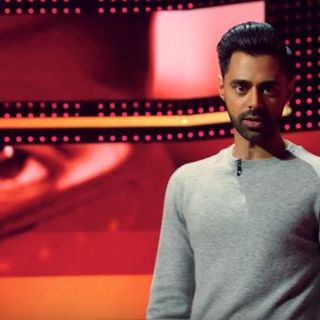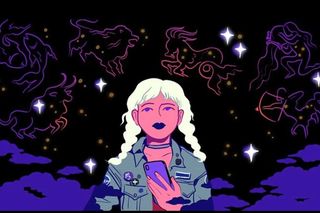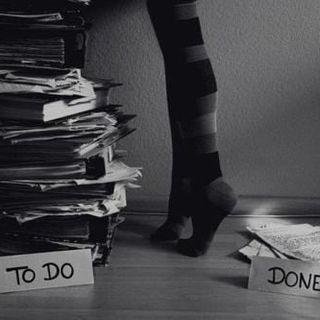
Millennials and Meme Culture Have Reclaimed Astrology
Social media influencers have given cosmic predictions a new edge.

If you aren’t currently worried about Mercury being retrograde then it’s likely you have yet to be introduced to the sprawling, meme-filled universe of astrology. It’s indisputably having a cultural resurgence in our zeitgeist. Social media has fostered the rise of a very specific breed of astrology buffs — they’re self-deprecating, funny as hell, and exceedingly millennial in their tastes and references. And while astrology has been relegated to the corners of newspapers for the last few decades, the Internet age has given star-charting and cosmic predictions a hilarious new edge.
Instagram accounts like @notallgeminis and @aaronjakesastrology have more than 100,000 followers, posting memes that’ll tell you which zodiac sign corresponds to which Sailor Moon character, cartoon dog, or lyric from Cardi B’s Invasion of Privacy. Twitter favorites @poetastrologers write weekly forecasts that are comfortingly vague and always beautiful.
For example, my horoscope for the third week of March is: “Week of 3/17 in Capricorn: You will be hoping that it all goes exactly as it should. Of course you’ve done everything to ensure that it will. Still, what is the point of going if it’s not the mildest moon. Just be sure you know exactly what you’re getting into.” What does this mean? I have no idea, but reading it feels like a soft, warm blanket. Suffice it to say, other people feel this way, too, since the account has more than 400,000 followers.
Online publications are seeing an uptick in the number of page visits to their daily, weekly, and monthly horoscope updates, and zodiac apps are using real-time NASA data to predict just how likely it is that your girlfriend will break up with you. Newsletters, social justice-themed horoscope readings, and literary zodiac posts are making the rounds on the Internet, as astrology is becoming more hip and mainstream than it has been since the 70s.
This is not your weird aunt reading out your horoscope about how you should be careful with money and travel, from the last couple of pages of Femina. While Indian astrology shows on channels like Aastha wax poetic about the Vedic astrological significance of Rahu and Ketu, people are out here dragging Rahul Gandhi for being a two-faced Gemini. Astrology has been reclaimed and revamped by millennials and the new, shiny packaging only makes it cooler.
Let’s be clear, though: There is zero science behind this trend. Our zodiac signs are calculated based on the planetary positions at the time of our birth. Most people will probably know their sun sign, the most famous zodiac sign, and the corresponding character traits, like Cancerians being over-sensitive or Librans being indecisive. But for the real deal, you have to calculate your birth chart, which can be done pretty easily, if you know the details of the time and place of your birth.
With the exact location of each of the planets at the moment of your birth, your astrological chart offers a more complex narrative of your specific characteristics, weaknesses, strengths, and what the future might hold. Of course, science will tell you that this is all bogus, which is true. But despite the clear lack of evidence that astrology works, there’s something about being told things about yourself that has captured this generation’s attention. Not unlike the self-care industry, which sells us healing crystals and sound baths, this trend seems very much like a shallow attempt at self-realization. But maybe that’s a more cynical take on it.
Yet while astrology may seem like a whole lot of navel-gazing, in this new form, it might actually be a bit more complex than we allow. For millennials, the crucial part of this trend is not really whether you believe in astrology or not, but whether you can relate to it, and find comfort in what it’s telling you about yourself. This generation is pretty okay with living in the limbo between fact and fiction — growing up with the Internet can mold you that way.
It makes more sense when we look at this sudden resurgence of astrology in the context of our world today. Studies have found that people turn to astrology in response to stressors in their lives. “Under conditions of high stress, the individual is prepared to use astrology as a coping device even though under low-stress conditions he does not believe in it,” said the study author, Graham Tyson. And this generation’s increased levels of stress and anxiety has been fairly well documented.
It’s comforting, in times of pain or trouble, to think ‘Oh, this is all because my moon sign is in the seventh house.’ And the memes that point out our weaknesses based on sun signs? They’re an exercise in self-awareness and reflection. Maybe, as a Capricorn, I do shut people out. Maybe I should make myself more emotionally available to the ones I love. There’s really nothing to fault with that advice. In our current moment of geopolitical (and possibly personal) turmoil, when climate change is now beyond our control, India and Pakistan could go to war any moment and you just got fired from your job, astrology becomes a solace. Eventually, the planets must realign, Mercury retrograde will end, and maybe things will turn out better in the future.
Nadia Nooreyezdan is The Swaddle's culture editor. Since graduating from Columbia Journalism School, she spends her time thinking about aliens, cyborgs, and social justice sci-fi. She's also working on a memoir about her family's journey from Iran to India.
Related


There’s a Way to Procrastinate That’s Actually Effective
